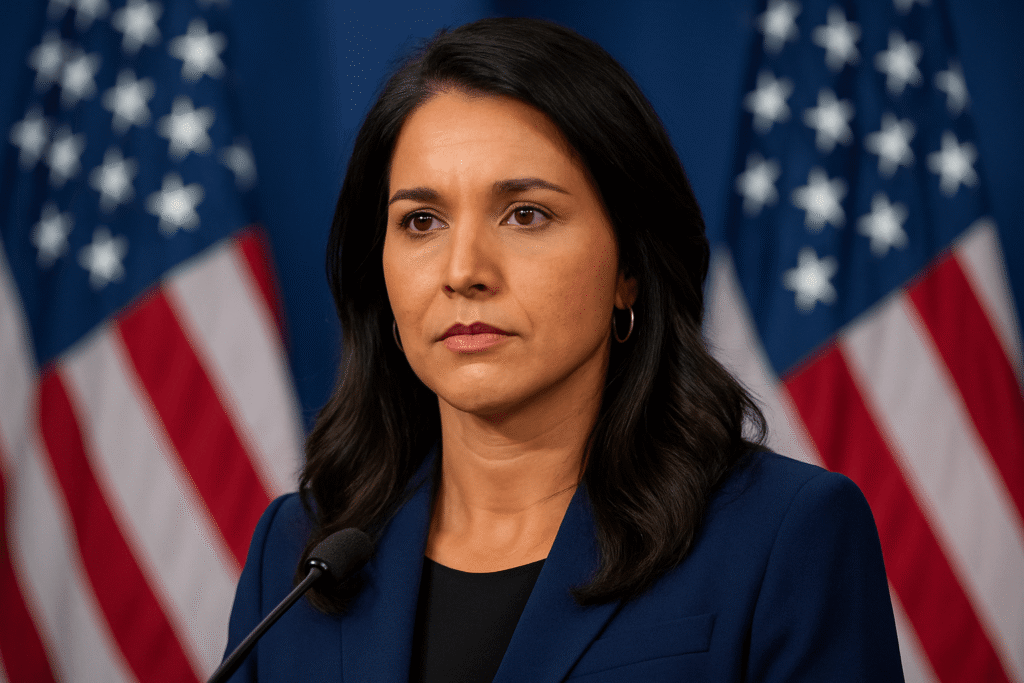|
Getting your Trinity Audio player ready... |
In a move that has ignited a firestorm in Washington, U.S. Director of National Intelligence (DNI) Tulsi Gabbard has revoked the security clearances of at least 37 current and former U.S. intelligence officials, according to a memo obtained by CNN. The decision has deepened divisions inside the intelligence community and raised fresh concerns about the politicization of intelligence at the highest levels of government.

High-Level Officials Targeted
A source familiar with the matter revealed that those stripped of their clearances include officials who previously assessed Russia’s 2016 election interference as well as members of President Joe Biden’s National Security Council. Many of the affected individuals are not well-known to the public, but they held senior roles across the CIA, FBI, and the Department of Defense.
The New York Post was the first to report on the revocations, which were later confirmed by Gabbard herself. Writing on X (formerly Twitter), Gabbard declared:
“Security clearance is a privilege, not a right. Those in the intelligence community who broke their oath to the Constitution and put their personal interests ahead of the American people’s have betrayed the sacred trust they promised to uphold.”
Memo Accuses Officials of Politicizing Intelligence
According to the memo distributed Monday to several U.S. Accusations that the people “politicized or weaponized intelligence information to advance partisan or personal agendas inconsistent with national security priorities” served as the rationale for the 2025 decision to revoke security clearances.
The document also claimed that some of the former officials failed to safeguard classified material and produced “unprofessional and biased” assessments. However, it did not provide evidence of specific wrongdoing.
Part of a Larger Trump-Era Effort
This dramatic step by Gabbard is viewed as part of a wider Trump administration intelligence purge, aimed at discrediting the 2017 intelligence assessment that concluded Russia interfered in the 2016 election to benefit Donald Trump over Hillary Clinton.
In July, Gabbard released documents she described as proof of a “treasonous conspiracy” within the Obama administration, including allegations involving former President Barack Obama himself. She referred possible criminal cases to the Justice Department, where Attorney General Pam Bondi has since authorized a grand jury intelligence probe.
CIA Director John Ratcliffe also challenged the 2017 findings, conducting his own review and forwarding several former officials to the FBI investigation unit. Bondi has instructed federal prosecutors to move forward with subpoenas in the high-profile case.
Democrats Blast Gabbard’s Actions
Critics from the Democratic Party argue that Gabbard is not depoliticizing the intelligence community but instead weaponizing intelligence against Trump’s perceived political enemies. They accuse her of using classified documents and conspiracy allegations to undermine opponents while shifting public attention away from scandals such as the release of the Jeffrey Epstein files.
National security attorney Mark Zaid, who previously lost his own clearance under Trump, strongly condemned the move:
“These are unlawful and unconstitutional actions that break with decades of established laws and policies designed to prevent exactly this kind of abuse. For this administration to accuse others of politicizing or weaponizing intelligence is the height of hypocrisy. This administration would make Senator McCarthy proud.”
Misrepresentation of Intelligence Findings
In her remarks, Gabbard frequently omitted or falsified intelligence evaluations, according to observers. For instance, while U.S. intelligence agencies confirmed that Russia attempted cyber intrusions into state voting systems in 2016, they also clarified there was no evidence that vote tallies were altered.
Similarly, Gabbard promoted a Republican-led House Intelligence Committee report that questioned whether Russian President Vladimir Putin favored Trump over Clinton. However, the report stopped short of claiming intelligence was fabricated or denying Russia’s election interference altogether positions Gabbard has repeatedly advanced.
National Security Controversy Intensifies
The latest revocations mark a dramatic escalation in Gabbard’s ongoing battle against what she calls the “politicization of intelligence.” Her supporters argue she is cleaning out corrupt elements within the U.S. intelligence community, while critics warn she is undermining the nation’s credibility and compromising national security for political gain.
Nearly ten years after the 2016 election meddling, the battle highlights the investigation’s lasting effects. With Trump allies back in positions of influence, the intelligence community now faces one of its most turbulent chapters since the Cold War.
Whether Gabbard’s actions will withstand legal challenges remains unclear. Attorneys for several of the affected officials are preparing lawsuits, while Congressional Democrats are pressing for hearings into what they describe as an abuse of power.
For now, one fact is certain: the battle over security clearances has become the latest flashpoint in America’s polarized debate over truth, trust, and national security priorities.







